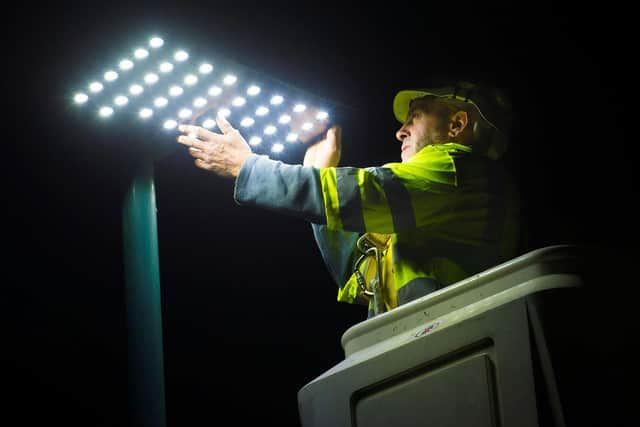Damp monitors in Leeds council houses ‘not spying’ says councillor
and live on Freeview channel 276
The comments were made during a discussion on Leeds City Council’s smart cities scheme, which aims to collect large amounts of data in order to improve services.
But one member of the authority’s infrastructure scrutiny committee expressed concerns about whether this could have implications on the privacy of individuals living in their homes.
Advertisement
Hide AdAdvertisement
Hide AdA report from council officers suggested the computer system used to control the new LED street lights could also help the authority introduce new devices to help monitor issues such as gullies, road temperature and damp in council houses.


Coun Neil Buckley (Con) told the meeting: “When I spent most of my career in sales, there were no smartphones, no computers, nothing – and it was wonderful.
“If I had a good week, I would nip up to Headingley on a Friday to watch the cricket and nobody knew – but it is now the opposite.
“But some of these things are fantastic, and the ability to respond to problems is a wonderful thing.”
Advertisement
Hide AdAdvertisement
Hide AdHe added he was concerned at the aspects it could have on the privacy of individuals in council houses, stating: “It conjured up a picture of a rap on the door from officials saying ‘you’re too damp – we have come to fix it whether you like it or not’ – I wonder if there is a balance between freedom and the opposite.”
Deputy leader of Leeds City Council James Lewis responded: “Nobody would object to us having a smoke detection system that sent the fire service out. This is a very similar approach – I have never had residents saying they want to keep the damp in their house.
“We know the impact of the number of disrepair claims we have in damp houses. It is a detector of dampness, not spying on people or listening to people’s activity – it’s as simple as a smoke detector.
“We are not having people outside the civic hall with placards saying ‘keep our damp’.”
Advertisement
Hide AdAdvertisement
Hide AdThe ideas were included in a document which outlines plans to turn Leeds into a ‘smart city’, where large amounts of data are used, supposedly to help make better decisions on services.
As part of work into fitting the city’s ‘smart street lights’, a so-called ‘internet of things’ network is being installed across the district. This, the document claims, will not only manage the lights but also ‘enable the deployment of new devices for the collection of data in real time’.
Chairing the meeting, Coun Paul Truswell (Lab) said: “This is an item the board has been looking at for four or five years. When we first started, people thought this was a bit dry and technocratic and something for the geeks. But this demonstrates how we have drilled down into the practical benefits for the community.
“There are plenty of examples about benefits for people receiving adult social care, as well as wider issues like air quality.”
Advertisement
Hide AdAdvertisement
Hide AdCouncil officer Dylan Roberts told the meeting: “It’s good to recognise that the scope of digital information in Leeds has expanded exponentially.
“Technology used to be about making processes more efficient, but we are in a world now where tech is in almost everything. With that brings a greater opportunity to bring about better services, but in particular how we can apply and use tech that might already be out there to make better outcomes for people in Leeds.
“Early identifications of damp – that is something that health are interested in. The council are addressing the issues of disrepair – they are also thinking about the health and well-being angle.”
The panel agreed to write to the chief council officer asking for reassurance that the coordination of smart cities was being addressed.